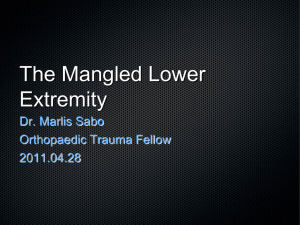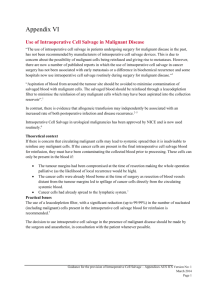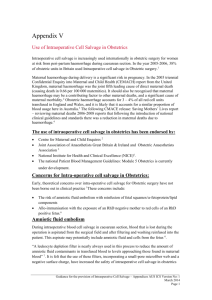salvage yard implementation documents
advertisement
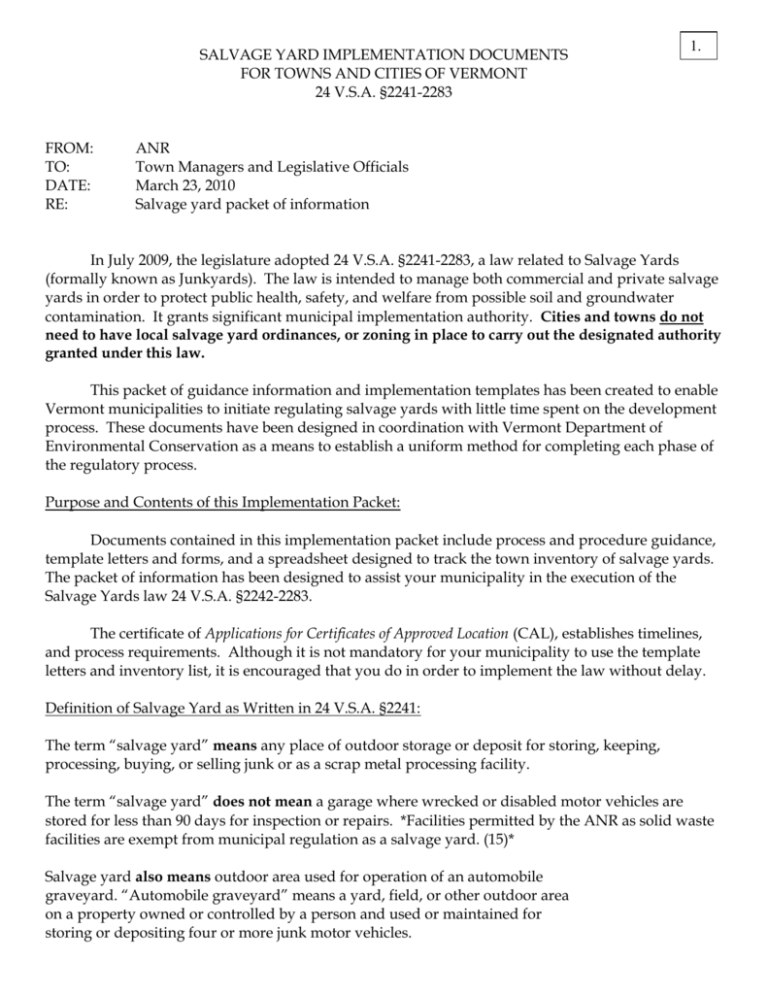
SALVAGE YARD IMPLEMENTATION DOCUMENTS FOR TOWNS AND CITIES OF VERMONT 24 V.S.A. §2241-2283 FROM: TO: DATE: RE: 1. ANR Town Managers and Legislative Officials March 23, 2010 Salvage yard packet of information In July 2009, the legislature adopted 24 V.S.A. §2241-2283, a law related to Salvage Yards (formally known as Junkyards). The law is intended to manage both commercial and private salvage yards in order to protect public health, safety, and welfare from possible soil and groundwater contamination. It grants significant municipal implementation authority. Cities and towns do not need to have local salvage yard ordinances, or zoning in place to carry out the designated authority granted under this law. This packet of guidance information and implementation templates has been created to enable Vermont municipalities to initiate regulating salvage yards with little time spent on the development process. These documents have been designed in coordination with Vermont Department of Environmental Conservation as a means to establish a uniform method for completing each phase of the regulatory process. Purpose and Contents of this Implementation Packet: Documents contained in this implementation packet include process and procedure guidance, template letters and forms, and a spreadsheet designed to track the town inventory of salvage yards. The packet of information has been designed to assist your municipality in the execution of the Salvage Yards law 24 V.S.A. §2242-2283. The certificate of Applications for Certificates of Approved Location (CAL), establishes timelines, and process requirements. Although it is not mandatory for your municipality to use the template letters and inventory list, it is encouraged that you do in order to implement the law without delay. Definition of Salvage Yard as Written in 24 V.S.A. §2241: The term “salvage yard” means any place of outdoor storage or deposit for storing, keeping, processing, buying, or selling junk or as a scrap metal processing facility. The term “salvage yard” does not mean a garage where wrecked or disabled motor vehicles are stored for less than 90 days for inspection or repairs. *Facilities permitted by the ANR as solid waste facilities are exempt from municipal regulation as a salvage yard. (15)* Salvage yard also means outdoor area used for operation of an automobile graveyard. “Automobile graveyard” means a yard, field, or other outdoor area on a property owned or controlled by a person and used or maintained for storing or depositing four or more junk motor vehicles. “Junk motor vehicles” means a discarded, dismantled, wrecked, scrapped, or ruined motor vehicle or parts thereof, or a motor vehicle, other than an on-premise utility vehicle, which is allowed to remain unregistered or uninspected for a period of 90 days from the date of discovery. “Automobile graveyard” does not include: an area used by an automobile hobbyist to store, organize, restore, or display motor vehicles or parts of such vehicles, provided that the hobbyist’s activities comply with all applicable federal, state, and municipal law; an area used for the storage of motor vehicles exempt from registration under chapter 7 of Title 23: wood splitters and pole dinkeys; an area owned or used by a dealer registered under 23 V.S.A. § 453 for the storage of motor vehicles; or an area used or maintained for the parking or storage of operational commercial motor vehicles, as that term is defined in 23 V.S.A. § 4103(4), that are temporarily out of service and unregistered but are expected to be used in the future by the vehicle operator or owner. Law Requirements and Summary of Authority Granted: Municipalities are required to review Applications for Certificates of Approved Location (CAL). A determination must be made whether the citing of a proposed, or existing but yet unregulated salvage yard, is located in an area restricting such uses or contrary to other existing bylaws. To summarize the authorities municipalities have to adequately and properly implement permissible locations includes: Adopt additional ordinances no less stringent than 24 V.S.A. §2241-2283 Right to inspect salvage yards to make sure they comply with the law, Impose screening requirements, Issue appropriate location conditions, and Issue appropriate environmental and public health conditions. Municipalities have received additional police power to apply proper legal actions to parties violating the law. Policing authority is extended to permit: Issuance of monetary penalties Obtainment of a temporary restraining order, and Preliminary injunction, or permanent injunction against the establishment, operation, or maintenance of a salvage yard which is in violation of terms of the statute or the CAL in Environmental Court. Resources for Additional Assistance: For further assistance please refer to the Salvage Yards Law: Questions and Answers sheet contained in this packet. A copy of the Salvage Yards law, 24 V.S.A. §2241-2283, is also included in this implementation packet for your reference. Additional questions may be directed to the Vermont Department of Environmental Conservation by contacting Gary Kessler, the Director of DEC Compliance & Enforcement Division, at 802/241-3820; or John Brabant, DEC Salvage Yard Inspector, at 802/241-3390.

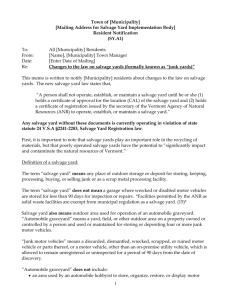
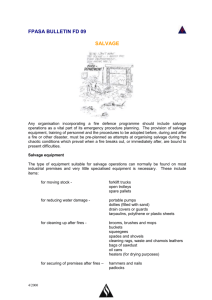


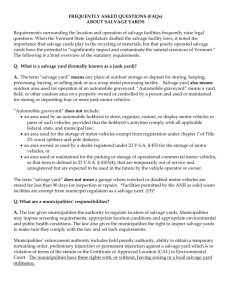
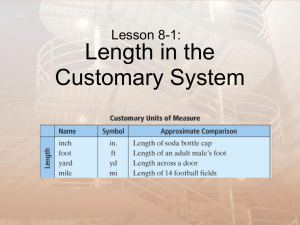
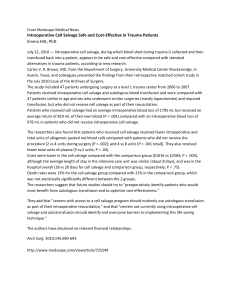
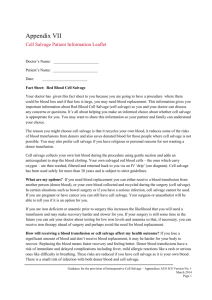

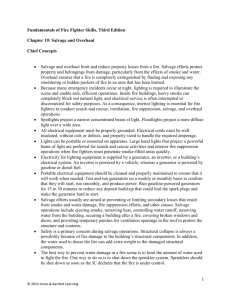

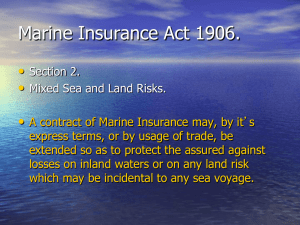
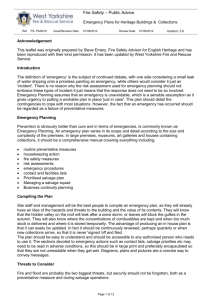
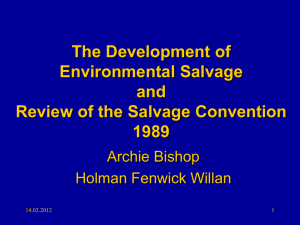
![Quiz chpt 10 11 Fall 2009[1]](http://s3.studylib.net/store/data/005849483_1-1498b7684848d5ceeaf2be2a433c27bf-300x300.png)

